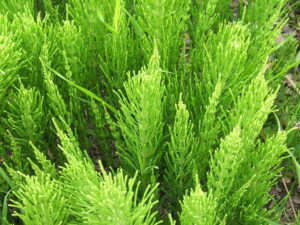Equisetum arvense, the field horsetail or common horsetail is a herbaceousperennial plant, native throughout the arctic and temperate regions of the northern hemisphere.
Contents
Uses
E. arvense herb has been used in traditional Austrian medicine internally as tea, or externally as baths or compresses, for treatment of disorders of the skin, locomotor system, kidneys and urinary tract, rheumatism and gout.
Benefits
It Promotes Bone Health
Equisetum arvense contains silica, a mineral that helps in bone repair and building strong tendons and bones by encouraging calcium absorption. Traditionally, it’s administered to help speed up bone healing after fracture or other bone trauma. It’s also recommended to help treat osteoporosis. In a study published in “Cell Proliferation” in 2012, scientists looked at how Equisetum arvense extract would interact with human bone cells in test tubes. They found that Equisetum arvense induced bone cell growth and concluded it may have potential in human bone regeneration.
It’s a Diuretic
According to an article published in the “Journal of Ethnopharmacology” in 2007, Equisetum arvense has naturally occurring diuretic properties. MedlinePlus reports it is used as a natural remedy for excess fluid retention, kidney stones, bladder stones and urinary tract infections. Its diuretic action is traditionally believed to speed up the excretion of kidney stones, but scientific evidence to validate its effectiveness is lacking.
It Lowers Blood Glucose Levels
A study published in the “Journal of Ethnopharmacology” in 2002 looked at the effects of Equisetum arvense on a small sample of patients with Type 2 diabetes. Some of the patients were given one dose of the extract orally, while others were given a placebo. Scientists measured the patients’ glucose levels at the time of the administration and at different intervals afterward. They found that blood glucose levels were significantly reduced at 90 minutes, two hours and three hours after Equisetum arvense administration, as compared to the placebo. This research suggests Equisetum arvense could potentially play a role in managing glucose levels.
Cautions
Although Equisetum arvense has some health benefits, it’s not considered safe for children, and it’s not to be taken in large doses or regularly over a long period. Taking Equisetum arvense consistently in the long term could cause thiamine deficiency, and this risk is exacerbated if you drink alcohol regularly. The University of Maryland Medical Center recommends taking no more than 300 milligrams of horsetail grass three times daily. If you’re making Equisetum arvense grass tea, brew no more than 3 teaspoons of it three times a day.
Interactions
None are recorded.
Other names
field horsetail or common horsetail
References
Wikipedia, https://en.wikipedia.org/wiki/Equisetum_arvense
LiveStrong, http://www.livestrong.com/article/126083-benefits-horsetail-grass/

